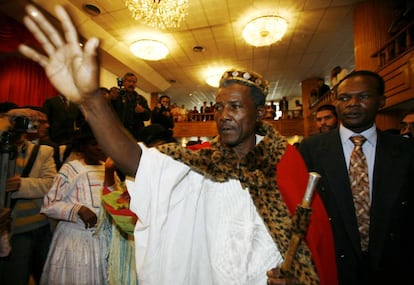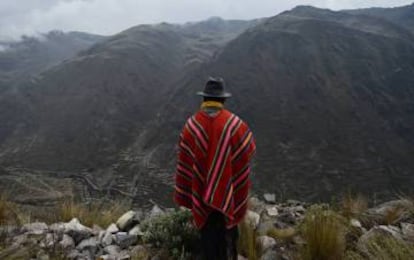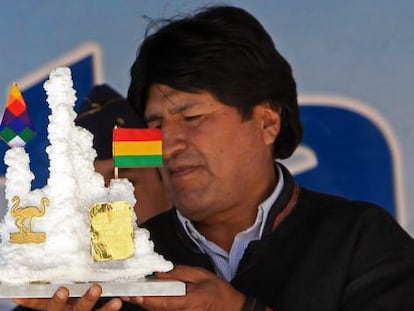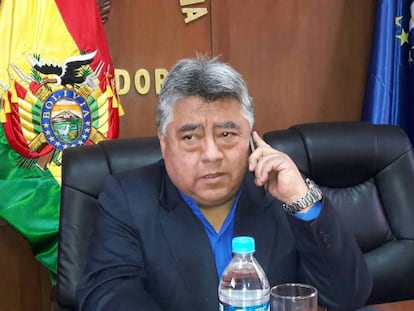The last king of the Americas
Julio Pinedo, a descendant of slaves, has been the symbolic monarch of Afro-Bolivians since 1992


It is eight in the morning. The sun’s rays are unable to pierce the thick fog covering the green slopes, ravines, rivers, waterfalls and lush vegetation surrounding Mururata, in the region of Los Yungas, northwest of the Bolivian capital of La Paz.
It is here, far away from the tribulations of the capital, that Julio Pinedo rules as the king of the Afro-Bolivians.
Pinedo is the recognized descendant of a Congolese monarch who was brought to Bolivia as a slave by the Spaniards in 1820.
His house is 50 meters away from Mururata’s main square. He lives there with his wife Angélica Larrea —the Afro-Bolivian queen— and their son Rolando, the crown prince.
The ground floor of their home also doubles as a grocery store that sells bananas, canned sardines, oil and soft drinks.
Pinedo is pessimistic about the chances of eradicating discrimination
Pinedo, 74, has worked in agriculture all his life. He wears neither a crown nor a cape in his everyday life – those adornments are reserved for special occasions.
These days, the king is busy building social housing near his own home as part of a state program. He works Mondays through Saturdays from 8am to 6pm, and he is already late for work today.
Sitting at the table, he pushes aside a cup of coffee and a slice of bread that were going to be his breakfast, and grants the reporter a few minutes of his time.
“King Bonifacio was my grandfather. Our ancestors were brought here to work in the mines of Potosí [in southwest Bolivia]. Later, they were brought to the area of Los Yungas, where they got sold to the hacienda owners,” he explains.
His ancestor was Prince Uchicho, of the Kongo people. He arrived in Bolivia around 1820 as part of one of the last shipments of slaves to the Latin American country.
Uchicho ended up working at the estate of the Marquis of Pinedo, whose name he adopted. He was crowned in 1832 and was succeeded by Bonifaz, then by José and Bonifacio, who was crowned in 1932.

“My grandfather was a very kind person. He loved my brother and me very much, but he was very strict,” recalls the current monarch.
But the royal lineage of the Pinedos was up in the air for many years after that. Following the death of Bonifacio in 1954, the family was unable to claim the title back until 1992, when Julio was recognized by his people.
In 2007, the government of La Paz crowned him again. And two years later, with the new Constitution, Bolivians of African descent were recognized as one of the 36 constituent ethnic groups of the Andean nation. This recognition bolstered Afro-Bolivian customs and traditions, including their own ancestral kingdom.
Julio Pinedo is recognized as a ceremonial figure, not as a political authority. He is sparing with his words, but speaks enough to express dissatisfaction with his people’s lack of organization.
“With a greater effort from everyone, I could do a better job as a representative,” he notes.
Until the National Revolution of 1952, Afro-Bolivians lived in semi-feudal conditions. After being recognized by the state, in 2012 they were included in the Census for the first time. Today, they are an estimated 26,000 people in a country of over 10 million.
His ancestor was Prince Uchicho, of the Kongo people
“A lot of progress has been made. We Afros are being taken into account, and we are present in places where important decisions are being made,” says Ancelma Perlacios, Bolivia’s first Afro-Bolivian senator, adding that the official acknowledgment of Julio Pinedo’s roots “means a lot” to her people.
But both the senator and the king believe there is still a lot of work to do to ensure that Afro-Bolivians receive the same kind of protection from the state as other ethnic groups. In Bolivia, over 41% of the population is indigenous.
But Pinedo is pessimistic about the chances of eradicating discrimination altogether.
“Racism and discrimination are never going to disappear from Bolivia,” he says. “The mixed-ancestry people, the indigenous population and the black population – each one gets their share of it. We are always pushing one another.”
Then, the last monarch of the Americas gets up to go work at the construction site.
English version by Susana Urra.
Tu suscripción se está usando en otro dispositivo
¿Quieres añadir otro usuario a tu suscripción?
Si continúas leyendo en este dispositivo, no se podrá leer en el otro.
FlechaTu suscripción se está usando en otro dispositivo y solo puedes acceder a EL PAÍS desde un dispositivo a la vez.
Si quieres compartir tu cuenta, cambia tu suscripción a la modalidad Premium, así podrás añadir otro usuario. Cada uno accederá con su propia cuenta de email, lo que os permitirá personalizar vuestra experiencia en EL PAÍS.
¿Tienes una suscripción de empresa? Accede aquí para contratar más cuentas.
En el caso de no saber quién está usando tu cuenta, te recomendamos cambiar tu contraseña aquí.
Si decides continuar compartiendo tu cuenta, este mensaje se mostrará en tu dispositivo y en el de la otra persona que está usando tu cuenta de forma indefinida, afectando a tu experiencia de lectura. Puedes consultar aquí los términos y condiciones de la suscripción digital.
More information

Bolivia’s untapped ‘white gold’
Archived In
Últimas noticias
Trans migrants are adrift in Trump’s America
Christian Louboutin: ‘Young people don’t want to be like their parents. And if their parents wear sneakers, they’re going to look for something else’
Isabella Rossellini: ‘If I started now, I would be a director, something unthinkable in my youth’
How your cat ended up on your lap: A book challenges the history of the domestication of the most popular feline
Most viewed
- A mountaineer, accused of manslaughter for the death of his partner during a climb: He silenced his phone and refused a helicopter rescue
- Liset Menéndez de la Prida, neuroscientist: ‘It’s not normal to constantly seek pleasure; it’s important to be bored, to be calm’
- Belle da Costa, the woman who concealed her origins in 1905 and ended up running New York’s most legendary library
- The number of international tourists going to the US is decreasing, with one exception: Mexico
- An interstellar traveler is getting closer to Earth than ever before: How to observe comet 3I/ATLAS









































